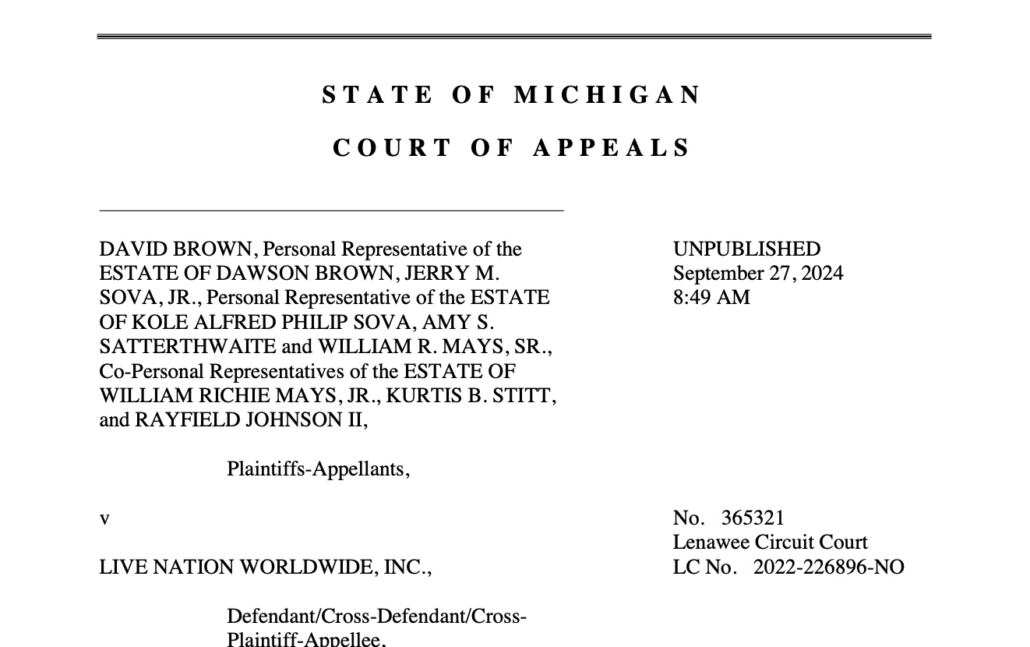Suit Dismissed in Faster Horses Festival CO Death Case
The Michigan Court of Appeals has found no liability for Live Nation in carbon monoxide campground deaths, despite ultra hazardous nature of generator exhaust in camp ground.
By Rebecca Martin
Recently I read a post on Reddit that asserted that carbon monoxide was not a potential risk at outdoor venues. This statement brought up a common misconception that carbon monoxide produced by fuel-burning devices is fine if it is being dissipated into external air.
There are many examples of why this is not a valid observation about the behavior of carbon monoxide. Air movement, air pressure and many other factors can influence the behavior of carbon monoxide gas.

The Michigan Court of Appeals dismisses case in Faster Horses Festival CO deaths case against Live Nation despite ultra hazardous nature of generator exhaust in campground.
Recently a controversial decision was reached by a Lenawee County judge regarding the deaths of campers at a Michigan musical festival in 2021.
Over 40,0000 fans attended the Faster Horses event in 2021. The weekend country music show had launched in 2013 and is nicknamed the “three-day hillbilly sleepover”, because attendees camp at sites in and around the Michigan International Speedway. 20-year-old Dawson Brown, 19-year-old Kole Sova and 20-year-old William Mays II, were high school friends who had played football together. They were camping along with 20-year-old Rayfield Johnson and 20-year-old Kurtis Stitt. They parked their travel trailer across the road from the Faster Horses Festival.
Michigan regulations typically require at least 1200 square feet per campsite “but the speedway — known as MIS — was allowed to create sites as small as 800 square feet if certain conditions were met, the appeals court noted.” https://apnews.com/article/michigan-music-fest-campground-deaths-52a7dbbd79c9798a5f90e68b64373b35
On Saturday, July 17, all five young men were discovered unresponsive in their travel trailer. Dawson Brown, Kole Sova and Richie Mays II were pronounced dead at the scene. Rayfield Johnson and Kurtis Stitt were transported to the hospital in critical condition. Initial news stories referred to the deaths as mysterious, but authorities soon revealed that the cause was carbon monoxide from a generator being accidentally exhausted underneath the trailer. Carbon monoxide had pooled and been drawn into the trailer resulting in a fatal concentration that killed the campers in their sleep. The carbon monoxide detector in the trailer was found to be non-functional. The initial investigation was compounded by another death at the event which was determined to be unrelated. https://www.freep.com/story/news/local/michigan/2021/07/19/faster-horses-festival-deaths-gas/8015377002/
The Lenawee County judge ruled that concert promoter Live Nation had no responsibility for the potential misuse of generators regarding the deaths and injuries which occurred in 2021. “Live Nation did not have a common-law duty to monitor plaintiffs’ campsite and discover the risk posed by the generator,” An appeals court confirmed that decision.
In the Michigan Court of Appeals decision, Brown v. Live Nation Worldwide, Inc. upheld the trial courts ruling. They stated:
There is no evidence that the alleged hazardous condition—the smaller size of the individual campsites—prevented campers from setting up generators so that the exhaust fumes were diverted above recreational vehicles, campers, and tents and away from camping areas. Plaintiffs had a superior degree of possession and control of their campsite and thus a superior ability to discover and remedy conditions on their reserved campsite, including the improperly vented generator that was set up by Mays and Watson. Invitors are not absolute insurers of the safety of their invitees. Hoffner, 492 Mich at 459. “An owner of property cannot be held liable under premises liability law for a design of the property that permits an invitee or person in control of the property to create a hazardous condition where none existed before.” Jones v DiamlerChrysler Corp, 488 Mich 1036; 793 NW2d 242 (2011). Plaintiffs were not injured by the smaller campsite size. They were injured by the carbon monoxide fumes emitted from the improperly vented generator that was set up by Mays and Watson. We conclude as a matter of law that Live Nation did not have a common-law duty to monitor plaintiffs’ campsite and discover the risk posed by the generator set up by Mays and Watson.
In dissent, Judge Allie Greenleaf Maldonado dissented saying that the case should be decided by jury.
While the trial court presented this case as a question of duty, the correct focal points of the analysis are breach and comparative negligence. Nobody disputes that defendants owed plaintiffs a duty to provide reasonably safe campsites free from foreseeable risks of harm. Plaintiffs argue that defendants breached this duty by providing unreasonably small campsites, by having too many campsites in the campground, and by failing to have 24/7 security patrols.
There are questions of fact regarding whether these guidelines were followed. In particular, plaintiffs assert that the campsites were smaller than 800 feet and that defendants did not provide the required security monitoring. Plaintiffs have already provided some evidence that these regulations were not followed, and additional discovery could have yielded additional information into this matter. Plaintiffs submitted comments on social media posts from other campers at the festival complaining that the campsites were surprisingly small and not meeting their space needs. Plaintiffs also submitted a news article that stated that new security and medical personnel would be available at the 2022 Faster Horses festival, suggesting that these administrative compliance measures were not in place in 2021. In addition to the evidence regarding compliance with these safety requirements, plaintiffs produced an expert affidavit suggesting that smaller campsites increase carbon monoxide risks. More generally, the expert opined that defendants “failed to mitigate a hazard to which the occupants of the incident RV were exposed causing a dangerous condition at the” campground.
It is a familiar argument which targets the consumer in generator cases. It assumes that all people are familiar with the potential risks of operating a generator outdoors and assumes that all people are familiar with the operation of generators in general. Yet generators continue to kill people every year. It is well documented that safety warnings on generators are not enough to guarantee public safety. Just as the boating industry has discovered that assuming people understand the risks of carbon monoxide during boating, all outdoor venues need to understand that it is a problem that can only be addressed by public education, prominently displayed safety warnings, carbon monoxide detector requirements and ultimately, the manufacturing industry’s attention.
There is another component when speaking of venues in which people are celebrating an event. We saw, historically, how many drownings were misdiagnosed as alcohol-related until a thorough study uncovered how many of those cases were the result of carbon monoxide exposure. Recommendations were made to educate first responders and medical personnel about the importance of ruling out carbon monoxide as a cause. And because we are talking about a venue promoted as “being a party” it is counter intuitive to expect attendees to be self-monitoring.
The current Faster Horses website for 2025 does have a section under camping addressing the use of generators in a very general way. It is item 10 on the list of camping policies at the very bottom of their page on camping passes. I can’t list the website because its security certificate has expired, and you must agree to enter the site at your own risk. Once there, you can find information on how to set up your generator to reduce noise and allow for safe ventilation and advises attendees to have carbon monoxide detectors or to purchase them from their local hardware store.
A Rolling Stone report discussed safety issues over the Faster Horses venue as the 2023 season kicked off. The report cited the 2021 investigative reporting of MLive. MLive is a media company that provides news, information, and marketing services for Michigan. It is based in Grand Rapid, founded in 1893. According to MLive, “Faster Horses has developed a reputation for the number of tragedies and assaults that have taken place on its grounds”. MLive found 30 reports of criminal sexual conduct, and 91 assaults since the festival began in 2013, about 5.5 times more than the state of Michigan. This number is 50% higher than reports of similar incidents at other large venues in Michigan.
The response to the deaths of 3 young men due to carbon monoxide poisoning resulted in legal actions. The report by Rolling Stone stated that family members of those killed or injured at the festival alleged that the campground was overcrowded, unsafe and improperly monitored and inspected. The family members contended that Live Nation and MIS were negligent, causing and requiring recreational vehicles to use campsites in “very close proximity” and against Michigan campground regulations. https://www.mlive.com/news/jackson/2023/07/tragedies-of-faster-horses-examined-by-rolling-stone-report-as-2023-festival-kicks-off.html
We would hope that carbon monoxide deaths be taken with the same seriousness and that venues are made as safe as humanly possible.

Leave a Reply
Want to join the discussion?Feel free to contribute!